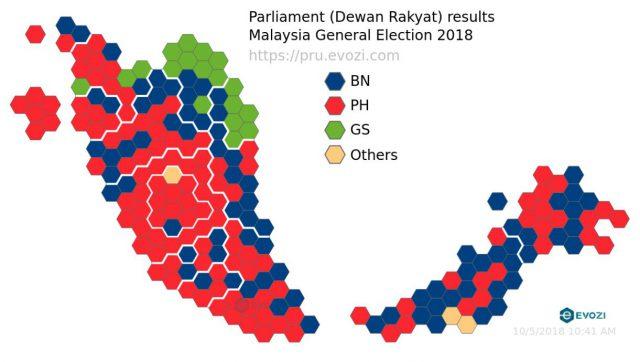Political tsunami or musical chairs?
Posted By Huong Le Thu on May 11, 2018 @ 13:30

The world woke up on 10 May to a ‘Malaysian tsunami [1]’, ‘new dawn [2]’ or ‘surreal shock [3]’—the almost completely unexpected outcome of Malaysia’s 14th general elections (GE14). The opposition—led by former Prime Minister Dr Mahathir Mohamad (Dr M), who returned to the political stage after 15 years in retirement—won a simple majority of 122 seats out of 222 according to the Electoral Commission [4].
The astonishing GE14 will go down in history as the election that ended the rule of the United Malay National Organization (UMNO)—now in the Barisan National (BN) coalition—which has run Malaysia since independence. Until now, no Malaysian prime minister has come from outside the UMNO, which celebrates its 72th anniversary on 11 May.
Dr M led UMNO for many years and was, from retirement, outgoing Prime Minister Najib Razak’s mentor before his recent turn to the opposition which was driven by his concern about the ruling elite’s poor management of the country. Specifically, the 1MDB scandal [5] prompted Dr M to turn against his former party and to call his role in the rise of Najib—whom he called ‘a monster’—as ‘the mistake of his life’.
The veteran politician called his campaign a ‘personal’ matter when he announced his surprising decision to return to politics to revive the ideals of the nation. Minutes after the announcement of the election results yesterday, he reassured the nation: ‘We are not seeking revenge [6]. What we want to do is to restore the rule of law.’
As I explained in my earlier analysis [7], the campaign had already featured many unexpected turns. But no one, not even long-time observers of Malaysian politics, would have predicted the result. Dr M, the nation’s patriarch, toppled the seemingly invincible Najib. The BN coalition, despite its troubled reputation, had looked rock-steady in the opinion polls ahead of the elections. Political commentators predicted that the opposition had, at best, a 15% chance [8] of winning. In-depth analyses indicated deep ethnic, economic and rural–urban divides in voting behaviours across the nation. Worries about ‘cash-for-vote [9]’ practices added more confusion and scepticism about the opposition’s prospects for success.
Some analyses have indicated that the country’s economic performance is more valued among voters than issues of political transparency. In fact, the cost of living, wages and taxes became some of the main focuses in the campaign. And for many, Mahathir’s promise to tackle those issues was the tilting factor.
The GE14 results have prompted many to cherish this victory of ‘multi-party’ and ‘multiethnic’ democracy. While it’s a positive development, it’s worth remembering that the Malaysian political scene is far from open and inclusive. There was no ‘new blood’ among the main contenders.
Instead, the political scene looks more like a game of musical chairs among the primary political players. Just consider that the opposition Pakatan Harapan (PH, Alliance for Hope) is led by Anwar Ibrahim, former aide-turned-enemy-turned-ally of Dr M. Currently under arrest, Anwar was also with the UMNO, and served as Deputy Prime Minister under Mahathir, who jailed him first in 1999 on sodomy charges [10].

Victories are intoxicating. But there will be little time for Malaysia to cheer because questions—are already mounting. Since this is the first power transition in the country’s history, there’s no precedent for most of the contested issues that will need to be resolved. This includes the most immediate one: whether the PH alliance can be considered as a single organisation for the purpose of entering the parliament and forming government, or if each party in the coalition will enter parliament individually.. At the post-election press conference, Najib tried this line: ‘No single party holds a simple majority of seats’, although he also conceded, ‘I accept the verdict of the people [4].’
Nervousness abounds. The Istana Negara (the palace) twice postponed the swearing in of a new prime minister. And speculation of vote buying grew. Mahathir had demanded his immediate swearing-in, which finally happened last night. He is now the seventh Prime Minister of Malaysia, and the world’s oldest prime minister.
Mahathir promised to be an interim prime minister. Dr Wan Aziza Wan Ismail—the wife of Anwar Ibrahim—is to become the Deputy Prime Minister. Mahathir promised to secure a royal pardon [11] for Anwar, and for Anwar to be released from prison in a couple of months, so that he can take over the leadership. How will a family-run government—a husband-wife PM and Deputy PM team, presumably with their daughter Nururl Izzah Anwar, who was also elected in her seat in Penang—work exactly?
And what will happen to Najib? He retained his seat. Will he be held accountable in the corruption cases he’s been linked to?
The spectacular comeback of Mahathir, and the likely return of Anwar, defied the odds. The GE14 proved that a change doesn’t need to be for something or someone new, but can embrace second chances. More than that, the remarkable election—some are calling it ‘the most important day in Malaysian history since its independence [12]’—is a victory for the Malaysian people, rather than the candidates per se.
Malaysia boleh! Well done.
Article printed from The Strategist: https://aspistrategist.ru
URL to article: /political-tsunami-or-musical-chairs/
URLs in this post:
[1] Malaysian tsunami: http://www.newmandala.org/malay-tsunami-horizon/
[2] new dawn: http://www.freemalaysiatoday.com/category/opinion/2018/05/10/a-new-dawn-a-nation-reborn/
[3] surreal shock: https://www.aljazeera.com/news/2018/05/malaysia-opposition-pulls-shocking-election-win-180509184811723.html
[4] Electoral Commission: https://www.straitstimes.com/asia/se-asia/malaysia-ge-najib-stops-short-of-conceding-power-says-king-will-decide-on-next-pm
[5] 1MDB scandal: http://www.bbc.com/news/world-asia-33447456
[6] We are not seeking revenge: http://time.com/5272113/mahathir-mohamad-defeats-najib-razak-malaysia-2018-election/?xid=time_socialflow_twitter&utm_source=twitter.com&utm_campaign=time&utm_medium=social
[7] earlier analysis: /the-daunting-state-of-southeast-asian-democracy/
[8] 15% chance: https://www.aljazeera.com/news/2018/05/malaysia-election-180508052746428.html
[9] cash-for-vote: https://www.iseas.edu.sg/medias/event-highlights/item/7472-conference-on-malaysia-s-ge14-high-expectations-heated-contests-huge-stakes
[10] sodomy charges: https://www.straitstimes.com/asia/se-asia/anwar-ibrahims-sodomy-cases-what-you-need-to-know
[11] royal pardon: https://www.malaysiakini.com/news/423999
[12] the most important day in Malaysian history since its independence: http://www.anu.edu.au/news/all-news/anu-experts-react-to-shock-malaysian-election
Click here to print.